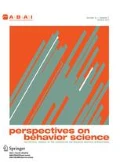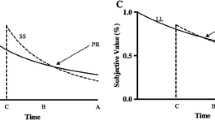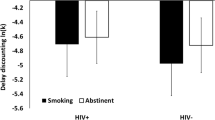Abstract
When both smaller–sooner (SS) and larger–later (LL) rewards are temporally distal, individuals frequently prefer the LL. However, because both outcomes become proximal, individuals frequently switch to preferring the SS. These preference reversals are predicted by hyperbolic delay discounting, and may model the essential challenge of self-control. Using smokers, a population known to have high rates of delay discounting, and thus more vulnerable to preference reversals, this pilot study sought to examine soft commitment as a strategy that may prevent preference reversals. Eleven smokers were assigned to an experimental commitment condition, operationalized as 3 weeks of daily commitment trials indicating preference between an SS and LL. Ten smokers were assigned to a control commitment condition. These 3 weeks were followed by 8 days of daily choice trials indicating preference between an impending SS and LL, for both experimental and control conditions. Though no overall difference of preference was observed between groups during the choice trials, hierarchical linear modeling revealed a decrease in preference for the LL over time by the control group (e.g., increasing trend of preference reversals) but no changes by the experimental group. This pilot study provides an initial indication that soft commitment can facilitate choice persistence and prevent preference reversals.



Similar content being viewed by others
References
American Psychiatric Association. (2017). What is addiction? Retrieved September 17, 2019, from https://www.psychiatry.org/patients-families/addiction/what-is-addiction
American Psychiatric Association, DSM-5 Task Force. (2013). Diagnostic and statistical manual of mental disorders: DSM-5™ (5th ed.). Arlington, VA: American Psychiatric Publishing.
American Society of Addiction Medicine. (2011). Addiction. Retrieved September 17, 2019, from https://www.asam.org/resources/definition-of-addiction
Ainslie, G., & Herrnstein, R. J. (1981). Preference reversal and delayed reinforcement. Animal Learning & Behavior, 9(4), 476–482.
Allen, S. S., Bade, T., Hatusukami, D., & Center, B. (2008). Craving, withdrawal, and smoking urges on days immediately prior to smoking relapse. Nicotine & Tobacco Research, 10(1), 35–45.
Du, W., Green, L., & Myerson, J. (2002). Cross-cultural comparisons of discounting delayed and probabilistic rewards. The Psychological Record, 52(4), 479–492.
Fagerstrom, K. O., & Schneider, N. G. (1989). Measuring nicotine dependence: a review of the Fagerstrom Tolerance Questionnaire. Journal of Behavioral Medicine, 12(2), 159–182.
Green, L., & Estle, S. J. (2003). Preference reversals with food and water reinforcers in rats. Journal of the Experimental Analysis of Behavior, 79(2), 233–242.
Green, L., Fisher, E. B., Perlow, S., & Sherman, L. (1981). Preference reversal and self control: Choice as a function of reward amount and delay. Behaviour Analysis Letters, 1(1), 43–51.
Green, L., Fristoe, N., & Myerson, J. (1994). Temporal discounting and preference reversals in choice between delayed outcomes. Psychonomic Bulletin & Review, 1, 383–389.
Green, L., & Myerson, J. (2004). A discounting framework for choice with delayed and probabilistic rewards. Psychological Bulletin, 130, 769–792.
Kirby, K. N., & Herrnstein, R. J. (1995). Preference reversals due to myopic discounting of delayed rewards. Psychological Science, 6, 83–89.
Kudadjie-Gyamfi, E., & Rachlin, H. (1996). Temporal patterning in choice among delayed outcome. Organizational Behavior & Human Decision Processes, 65, 61–67.
Mazur, J. E. (1987). An adjusting procedure for studying delayed reinforcement. In M. L. Commons, J. E. Mazur, J. A. Nevin, & H. Rachlin (Eds.), Quantitative analyses of behavior, Vol 5. The effect of delay and of intervening events on reinforcement value (pp. 55-73). Hillsdale, NJ: Lawrence Erlbaum Associates, Inc.
National Institute on Drug Abuse. (2014). Drug misuse and addiction: What is drug addiction? Retrieved September 17, 2019, from https://www.drugabuse.gov/publications/drugs-brains-behavior-science-addiction/drug-misuse-addiction
Niaura, R. S., Rohsenow, D. J., Binkoff, J. A., Monti, P. M., Pedraza, M., & Abrams, D. B. (1988). Relevance of cue reactivity to understanding alcohol and smoking relapse. Journal of Abnormal Psychology, 97(2), 133–152.
Rachlin, H. (1995). Self-control: Beyond commitment. Behavioral & Brain Sciences, 18, 109–159.
Rachlin, H. (2000). The science of self-control. Cambridge, MA: Harvard University Press.
Rachlin, H., & Green, L. (1972). Commitment, choice and self-control. Journal of the Experimental Analysis of Behavior, 17, 15–22.
Raudenbush, S. W., & Bryk, A. S. (2002). Hierarchical linear models: Applications and data analysis methods (2nd ed.). Thousand Oaks, CA: Sage Publications, Inc.
Reynolds, B. (2006). A review of delay-discounting research with humans: Relations to drug use and gambling. Behavioural Pharmacology, 17(8), 651–667.
Siegel, E., & Rachlin, H. (1995). Soft commitment: Self-control achieved by response persistence. Journal of the Experimental Analysis of Behavior, 64, 117–128.
Slopen, N., Kontos, E. Z., Ryff, C. D., Ayanian, J. Z., Albert, M. A., & Williams, D. R. (2013). Psychosocial stress and cigarette smoking persistence, cessation, and relapse over 9–10 years: A prospective study of middle-aged adults in the United States. Cancer Causes Control, 24(10), 1849–1863.
Solnick, J. V., Kannenberg, C. H., Eckerman, D. A., & Waller, M. B. (1980). An experimental analysis of impulsivity and impulse control in humans. Learning & Motivation, 11, 61–77.
Vangeli, E., Stapleton, J., Smit, E. S., Borland, R., & West, R. (2011). Predictors of attempts to stop smoking and their success in adult general population samples: A systematic review. Addiction, 106, 2110–2121.
Yi, R., Matusiewicz, A. K., & Tyson, A. (2016). Delay discounting and preference reversals by cigarette smokers. Psychological Record, 66(2), 235–242.
Yi, R., Mitchell, S. H., & Bickel, W. K. (2010). Delay discounting and substance abuse-dependence. In G. J. Madden & W. K. Bickel (Eds.), Impulsivity: The behavioral and neurological science of discounting (pp. 191–211). Washington, DC: American Psychological Association.
Zhou, X., Nonnemaker, J., Sherrill, B., Gilsenan, A. W., Coste, F., & West, R. (2009). Attempts to quit smoking and relapse: Factors associated with success or failure from the ATTEMPT cohort study. Addictive Behaviors, 34(4), 365–373.
Author information
Authors and Affiliations
Corresponding author
Additional information
Publisher’s Note
Springer Nature remains neutral with regard to jurisdictional claims in published maps and institutional affiliations.
This project was funded by National Institute of Drug Abuse grants R01 DA11692 (RY), K02 DA034767 (RY), and T32DA007292 (KNT). The authors thank the numerous undergraduate research assistants who contributed to recruitment and data collection on this project. None of the authors have any conflicts of interests to declare.
Rights and permissions
About this article
Cite this article
Yi, R., Milhorn, H., Collado, A. et al. Uncommitted Commitment: Behavioral Strategy to Prevent Preference Reversals. Perspect Behav Sci 43, 105–114 (2020). https://doi.org/10.1007/s40614-019-00229-8
Published:
Issue Date:
DOI: https://doi.org/10.1007/s40614-019-00229-8




